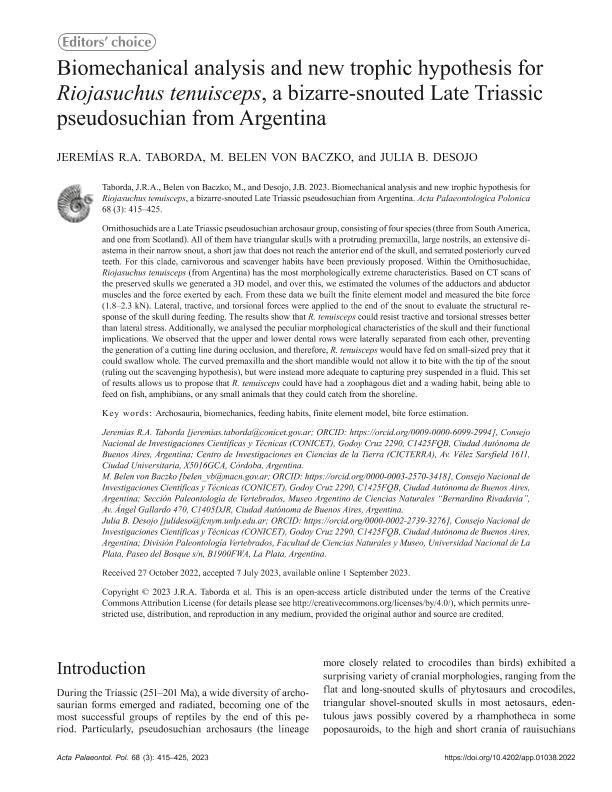Mostrar el registro sencillo del ítem
dc.contributor.author
Taborda, Jeremías Ramón Alejandro

dc.contributor.author
Von Baczko, Belen

dc.contributor.author
Desojo, Julia Brenda

dc.date.available
2024-02-07T16:03:11Z
dc.date.issued
2023-09
dc.identifier.citation
Taborda, Jeremías Ramón Alejandro; Von Baczko, Belen; Desojo, Julia Brenda; Biomechanical analysis and new trophic hypothesis for Riojasuchus tenuisceps, a bizarre-snouted Late Triassic pseudosuchian from Argentina; Polish Academy of Sciences. Institute of Paleobiology; Acta Palaeontologica Polonica; 68; 3; 9-2023; 415-425
dc.identifier.issn
0567-7920
dc.identifier.uri
http://hdl.handle.net/11336/226208
dc.description.abstract
Ornithosuchids are a Late Triassic pseudosuchian archosaur group, consisting of four species (three from South America, and one from Scotland). All of them have triangular skulls with a protruding premaxilla, large nostrils, an extensive diastema in their narrow snout, a short jaw that does not reach the anterior end of the skull, and serrated posteriorly curved teeth. For this clade, carnivorous and scavenger habits have been previously proposed. Within the Ornithosuchidae, Riojasuchus tenuisceps (from Argentina) has the most morphologically extreme characteristics. Based on CT scans of the preserved skulls we generated a 3D model, and over this, we estimated the volumes of the adductors and abductor muscles and the force exerted by each. From these data we built the finite element model and measured the bite force (1.8-2.3 kN). Lateral, tractive, and torsional forces were applied to the end of the snout to evaluate the structural response of the skull during feeding. The results show that R. tenuisceps could resist tractive and torsional stresses better than lateral stress. Additionally, we analysed the peculiar morphological characteristics of the skull and their functional implications. We observed that the upper and lower dental rows were laterally separated from each other, preventing the generation of a cutting line during occlusion, and therefore, R. tenuisceps would have fed on small-sized prey that it could swallow whole. The curved premaxilla and the short mandible would not allow it to bite with the tip of the snout (ruling out the scavenging hypothesis), but were instead more adequate to capturing prey suspended in a fluid. This set of results allows us to propose that R. tenuisceps could have had a zoophagous diet and a wading habit, being able to feed on fish, amphibians, or any small animals that they could catch from the shoreline.
dc.format
application/pdf
dc.language.iso
eng
dc.publisher
Polish Academy of Sciences. Institute of Paleobiology

dc.rights
info:eu-repo/semantics/openAccess
dc.rights.uri
https://creativecommons.org/licenses/by/2.5/ar/
dc.subject
ARCHOSAURIA
dc.subject
BIOMECHANICS
dc.subject
BITE FORCE ESTIMATION
dc.subject
FEEDING HABITS
dc.subject
FINITE ELEMENT MODEL
dc.subject.classification
Paleontología

dc.subject.classification
Ciencias de la Tierra y relacionadas con el Medio Ambiente

dc.subject.classification
CIENCIAS NATURALES Y EXACTAS

dc.subject.classification
Otras Ciencias Biológicas

dc.subject.classification
Ciencias Biológicas

dc.subject.classification
CIENCIAS NATURALES Y EXACTAS

dc.title
Biomechanical analysis and new trophic hypothesis for Riojasuchus tenuisceps, a bizarre-snouted Late Triassic pseudosuchian from Argentina
dc.type
info:eu-repo/semantics/article
dc.type
info:ar-repo/semantics/artículo
dc.type
info:eu-repo/semantics/publishedVersion
dc.date.updated
2024-02-06T13:22:02Z
dc.identifier.eissn
1732-2421
dc.journal.volume
68
dc.journal.number
3
dc.journal.pagination
415-425
dc.journal.pais
Polonia

dc.journal.ciudad
Varsovia
dc.description.fil
Fil: Taborda, Jeremías Ramón Alejandro. Consejo Nacional de Investigaciones Científicas y Técnicas. Centro Científico Tecnológico Conicet - Córdoba. Centro de Investigaciones en Ciencias de la Tierra. Universidad Nacional de Córdoba. Facultad de Ciencias Exactas Físicas y Naturales. Centro de Investigaciones en Ciencias de la Tierra; Argentina
dc.description.fil
Fil: Von Baczko, Belen. Consejo Nacional de Investigaciones Científicas y Técnicas. Oficina de Coordinación Administrativa Parque Centenario. Museo Argentino de Ciencias Naturales "Bernardino Rivadavia"; Argentina
dc.description.fil
Fil: Desojo, Julia Brenda. Universidad Nacional de La Plata. Facultad de Ciencias Naturales y Museo. División Paleontología Vertebrados; Argentina. Consejo Nacional de Investigaciones Científicas y Técnicas. Centro Científico Tecnológico Conicet - La Plata; Argentina
dc.journal.title
Acta Palaeontologica Polonica

dc.relation.alternativeid
info:eu-repo/semantics/altIdentifier/url/https://www.app.pan.pl/article/item/app010382022.html
dc.relation.alternativeid
info:eu-repo/semantics/altIdentifier/doi/http://dx.doi.org/10.4202/app.01038.2022
Archivos asociados
